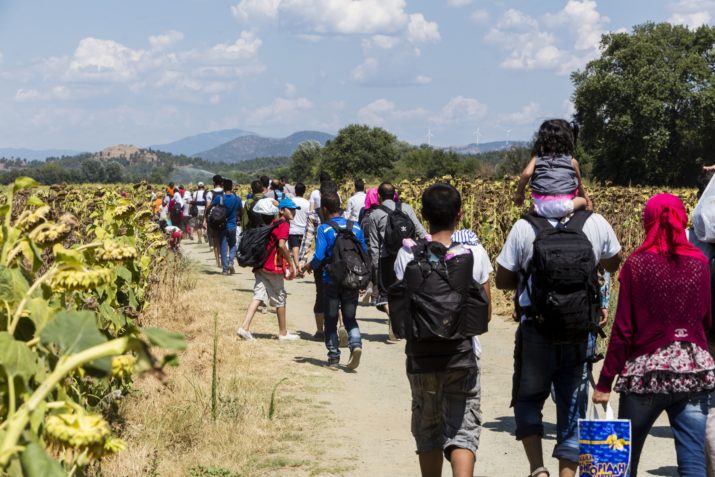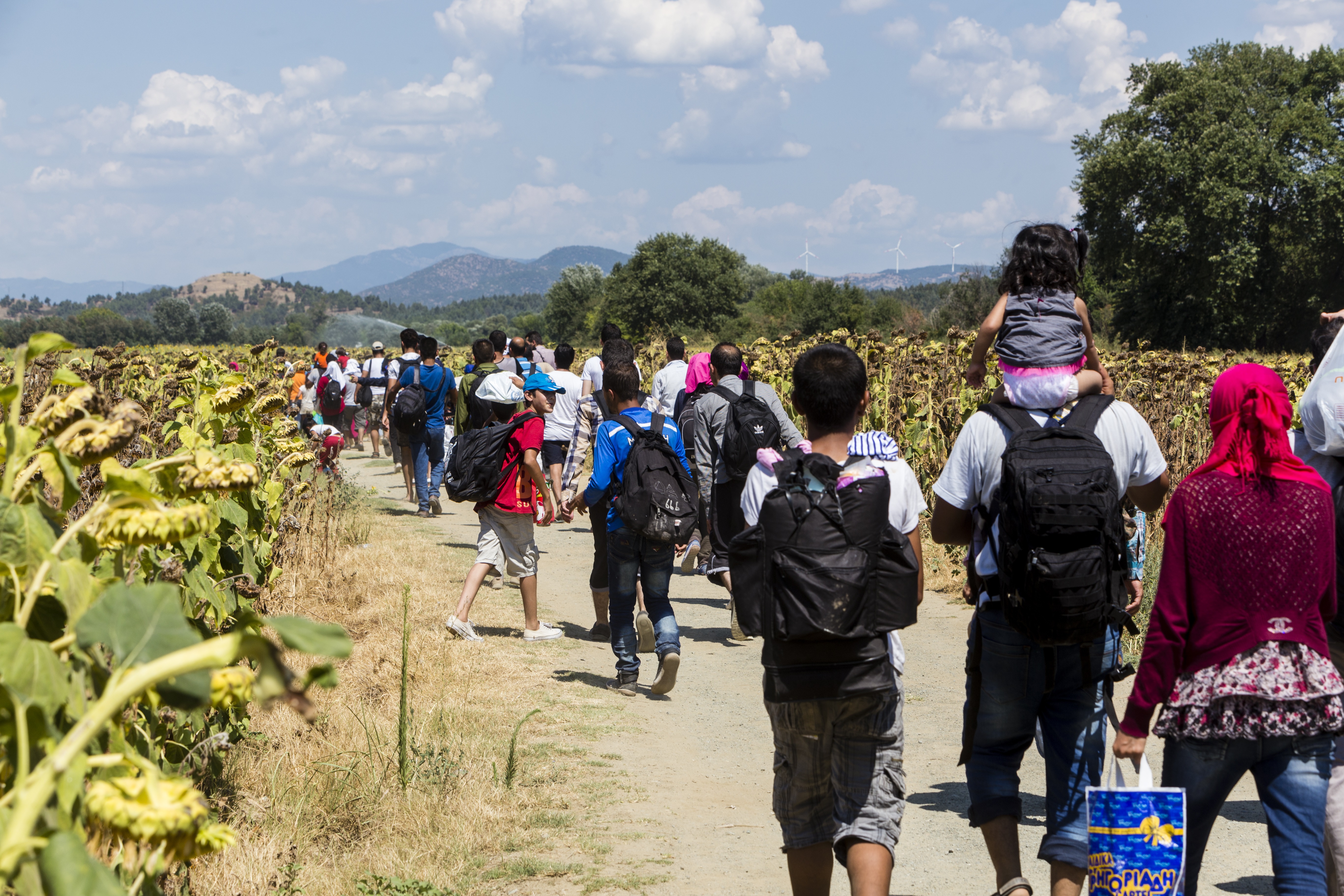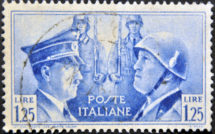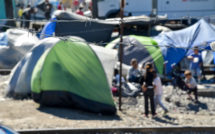

This is part of a round table on the refugee crisis:
-
“Refugees in Athens: There is No Humanity in this Place” by Melissa Kerr Chiovenda
-
“Criminalizing the Mediterranean Leads to Death and Division” by Sharon Jacobs
-
“’I am Odysseus:’ Tracing Mobile Desires and Resistance to Confinement Through Pseudonyms” by Árdís K. Ingvars
Early on in my research, I designed a method of offering agency to my interlocutors through the designation of pseudonyms based on heroes of their childhood adventures, or role models in their lives. The method arose out of a lack of positive visibility or role models in Western culture for women and non-white people (Puwar 2004). The practice aimed to give the interlocutors space to share their own inspirational models and often brought up fond memories:
Uhm… Longlegs! My mother used to call me that, like: Longlegs, come here! Ha, ha, ha! … I have a lot of heroes. When I was a small kid my heroes were pilots. When I grew up a little, my hero changed into Bruce Lee, and when I was a teenager my hero was the footballer, Rivaldo. (Rivaldo)
This method was formed, moreover, under the influence of critical work on European policies, laws, and regulations around eligibility of refugees for asylum, like that of Liisa Malki (1995, 510-512), who demonstrated that scholars researching displaced people have contributed to the illusion of a singular “refugee-ness.” Whether intentionally or unintentionally, scholarly research on refugees has contributed to the growing practice of exclusion within European nations (see also Fekete, 2005). Recent critical studies have further illuminated that it is mostly young, single men from the Global South that are excluded from refugee rights, as they are thought to be bogus refugees, criminals, sexual predators, or terrorists (Griffiths 2015; Kirtsoglou and Tsimouris 2018; Mascini and Van Bochove 2009). This demonstrates Malkki’s (1995) point that refugee laws are more about controlling national fears of “things,” rather than about upholding universal human rights. As such, people situated in the asylum system have little power over how they are categorized, nor do they control the shifting meanings implanted in the definitions of these categories, such as a refugee, migrant, or “illegal immigrant.” Sometimes they are even assigned names by border guards, which are picked up in the Western media for the consumption of their readers, as was the case with the body of the Syrian-Kurdish boy found on the Turkish coast in 2015 (Khouri 2015, 4. September). The right to self-identification may be one of the fundamental rights of any human being, yet names are never given or embedded in a social vacuum. Michael Jackson (2005, 80-84) pointed out that there are magical elements believed to be embedded in a name. Names can be assigned to diminish the power of a person and names can be given as a promise of potential. Names in many cultures change throughout a person’s life and some people can renegotiate their names to reflect their hopes and/or empowerment in relation to restrictive social boundaries. Considering that most of my (im)mobile interlocutors were aware of their negative image in Europe, my aim was that the choice of a secret name (which would hopefully shelter them from harm) should reside with the most relevant persons, instead of a Western scholar assigning names for the comfort of readers.
My fieldwork on the molding of masculinities in relation to solidarity movements and border struggles was mainly conducted in Athens between 2012 and 2018. I conducted some interviews with local volunteers but the main focus was (im)mobile men. Unintentionally, asking the interlocutors to choose their pseudonyms opened a new space in our dialogues, one of nostalgia and smiles. My interlocutors had often preemptively positioned themselves to give account of their “refugee-ness.” Conversing with anthropologist Andromachi Papaoiannou during my fieldwork, she referred to this kind of interview as “the press interview,” where the value of non-citizens’ stories has been pre-determined by Western images of pitifulness, pliability, and gratitude. This has been further demonstrated by Ann-Christine Wagner (2018) in relation to refugees in Jordan. The interviews about their displaced experiences do entail important aspects of people’s lives, but as Malkki (1995) has stressed, refugees have myriad life experiences and/or components to their identities, and not all of them are catastrophic. Thus, when I started interviews by asking about my interlocutors’ choice of pseudonym and suggested their childhood role models or heroes, their posture would sometimes change. They sat back in their seats, laughed, and often became a bit nostalgic.
The men would chose various names—some reflected admiration of an older cousin, a few centered around fictional characters from movies or cartoons, and on rare occasions, the names of resistant martyrs were chosen (see Ingvars and Gíslason, 2018a). However, it was quite common for both locals and refugees within the solidarity movement to choose a hero who represented mobility. It may appear, at first sight, that the names were chosen as symbols of masculine strength, but the stories behind the names reveal a desire for kindness, for a respect of everyone’s fragility, and most of all, for mobility. In some ways, it may be that by embedding a name, my interlocutors desired to magically influence their transnational identity in the world as they negotiated their current boundaries and their own personal fragility at the same time. Similarly, the names chosen by the locals often related to the refugees’ struggle to escape confinement, as was the case for Kal-el.
Kal-el was an older Greek man who had been involved in Greek leftist solidarity movements since his university years. When we sat down for an interview, he chose a café, close to his home in Viktoria square. At the time, the square was full of refugee families. While we sat there, the children were running around, and Kal-el expressed joy at hearing children’s laughter filling the square. He recalled his own childhood in the area, when the city was besieged with civil wars. When I asked him who his childhood hero was he immediately responded: Superman! Then he went on to explain:
I liked the space stories. In fact, every week I used to buy the new weekly magazine right at this kiosk. … My mother had to work afternoon shifts … And she didn’t trust the girls she left me with very much, so it was decided that I was not allowed out until the evening when she returned. So, as I have no brothers and sisters, this meant I had long hours with Superman comics, and children’s books, and imaginary stories and so forth. … I liked the space stories, the krypton thing, the other planets and that he could fly.
His story tells how he related to Superman’s persona as someone who could transgress even the boundaries of space. Moreover, Kal-el’s recount demonstrates how some Europeans have related to refugees’ sufferings through collective memories of their own folks (Naguib, 2016) or current struggles for a decent life (Cabot, 2018). Later on, he would further convey that his own childhood confinement made him relate to other people’s desire for mobility. Thus, within the text he became Kal-el, as that was Superman’s name in space. There was also another name that reflected this commonality, but it was mainly chosen by my (im)mobile interlocutors: the stage name of the actor and martial artist Bruce Lee. Here, I share the story of Jung Fan, a pseudonym based on the actor’s original name, to demonstrate a common factor among my Afghan interlocutors:
Bruce Lee was very famous. When I was a child, I did not see the movies. But mostly posters, photos, books, and comics. I was fourteen when I first saw his first movies because we didn’t have tv, it was destroyed, everything was destroyed during the war. … I was born in war, I grew up with the war. It is a kind of reality that you get used to. I remember when I was seven and we went to the mountains during the war. At night they were shooting this kind of light bullet, that was making a lot of fire, it was like celebration of Christmas here. … So, yeah, we were the generation of the war. … We were making things that we got from the war. I remember because my father was very poor, and I wanted to buy new shoes in the new year. I was going to the mountain collecting the metal from the bombs and selling it to buy the shoes. Of course, a lot of children they lose hands and feet, in accidents from some of these untriggered bombs. I was lucky. I did not have an accident.
There, Jung Fan’s memories of confinement are related to war, and yet his endurance, courage, luck, and a bit of recklessness, enabled him to buy something that symbolized social and geographical mobility—shoes. Similarly, he related to the image of Bruce Lee, posted around him as a man who transcended poverty and hardship with endurance and inner strength. This was confirmed by several other Afghani that I encountered, even if they later decided on another name, such as Rivaldo. Moreover, it was both men of Hazara and Pashtun origin that proclaimed their admiration for Bruce Lee. It leaves some food for thought that the men related to the actor’s stage name as assigned in Hollywood, as that was the name that made him capable of transcending his circumstances. It was by this name that Afghans knew him, and as such he symbolized an Asian hero, the ethnic other, in a world dominated by white action heroes. By relating to his assigned name, they may have been negotiating between assimilation and affirming their own worth. Still, despite his image being a poster of muscular resistance, they rarely related to Bruce Lee’s power as a martial artist. This may be due to the criminalizing images in the Western media associated with Muslim men who use violence as a means of resistance. Furthermore, among the Greek solidarians, there were tensions around the use of violence in protests (Ingvars and Gíslason, 2018b). Continually under threat from violence by others, the (im)mobile men in this study believed it possible to show one’s worth without the use of violence (Ingvars and Gíslason, 2018a). To demonstrate, let me convey the words of Maradonna:
I grew up in the downtown, south of Teheran. Low income people, very lively area, many children. … When I was kid it was in fashion to play soccer and Maradonna’s behavior was heroic for us. … He was very close to us, to easterners, our way of behavior, our way of thinking. In his playing, he was not attacking others, he had his own tactics, and he had this mind, very much behaving like a man but a right kind of man. He was not searching for problems or getting in quarrels with others. He was doing his game and his tactic.
Maradonna’s story describes a desire to have an alternative way of performing masculinity, without violent confrontations. At the same time, when discussing the footballer’s drug problems, this Maradonna related to the imperfection of any human being:
Like we saw people standing in the corner and we knew they were smoking drugs. But at the same time, we were playing and if the ball was thrown to them, they were playing with us again, and we knew they were smoking drugs. …as we interpreted it, any person who is on drugs or whatever he or she is, they have the right to change, to play football or to have a good life! It does not mean that he is a bad person, that you have the right to kill them.
Thus, Maradonna not only reflected a common fallibility, but also that a person’s true worth lies in their acts of kindness. In this way, caring was valued as much as mobility.
The common denominator within these stories is the elevated symbol of mobility (Salazar 2018). However, the stories around the names further reflect everyone’s fragility, thus illuminating the men’s wishes to be acknowledged as human beings with myriad experiences (Mallki, 1995), countering the defining criminalized image of men from the Middle-East in Europe. As Lila Abu-Lughod (2002) demonstrated, it is possible to trace power through shifting modes of resistance. My interlocutors’ choice of names most of all indicates a resistance to their (im)mobile status, thus their main agency is directed towards the border regime that continually grounds them through criminalizing images and minor transgressions (Griffiths 2015). Melanie Griffiths (2015) has noted that men stuck within the asylum system are commonly stuck between the images of weakness and barbarianism, both which renders them undesirable citizens. The pseudonyms chosen by the men in this study demonstrate a resistance toward such a narrow identification. They chose to embed the “heroic ethnic other” known around the world and at the same time to be simply human. Even if their chosen heroes were not of their own ethnicity, they related to their struggles and aspired to their transnational status. It may appear that they chose names that represent the kind of extraordinary talents that help a person transcend lengthy and insecure asylum application processes, a practice known as cherry picking (Fassin 2011). But their stories also reflect the value of kindness and dignity, which are attributes that were highly valued within the leftist Greek solidarity movement. Still, there is also a trace of another resistance in their chosen names, and that is one that strives to ensure that their individuality does not get lost within the movement of solidarity. In a sense, this does not simply relate to the desire of (un)becoming a refugee, but the magical wish of (re)becoming a free human being.
Árdís K. Ingvars is a PhD candidate from the University of Iceland, which is associated with Panteion University in Athens. Currently her thesis “Border masculinities. Emergent subjectivities through humanity, morality and mobility” is under external review.
Photo: Idomeni, Greece, April 15, 2016 – Thousands of migrants stuck in Idomeni. The camp for refugees and migrants at the Greek-Macedonian border near Idomeni
Published on February 5, 2019.
References:
Abu-Lughod, Lila. 1989. “The Romance of Resistance: Tracing Transformations of Power through Bedouin Women.” American Ethnologist 17: 41-55.
Cabot, H. 2018. The European Refugee Crisis and Humanitarian Citizenship in Greece. Ethnos, DOI: 10.1080/00141844.2018.1529693
Fassin, Didier. 2011. “Policing borders, producing boundaries. The governmentality of immigration in dark times.” Annual review of anthropology 40: 213-226.
Fekete, Liz. 2005. “The deportation machine: Europe, asylum and human rights.” Race and Class 47: 64-91.
Griffiths, Melanie. 2015. “Here, Man Is Nothing!”: Gender and Policy in an Asylum Context.” Men and Masculinities 18: 468–88
Jackson, Michael. 2005. Existential anthropology: Events, exigencies and effects. New York: Berghahn Books.
Invars, Árdís and Gíslason, Ingólfur. 2018a. “Moral mobility: Emergent Refugee Masculinities among Young Syrians in Athens.” Men and Masculinities 21: 383-402.
Ingvars, Árdís and Gíslason, Ingólfur 2018b. “Acts of caring in the shadow of violence: Reconstruction of moral masculinities among Greek leftist volunteers.” Masculinities, A Journal of Identity and Culture 9-10: 30-64.
Kirtsoglou, Elisabeth. and Giorgos. Tsimouris. 2018. “Migration, crisis, liberalism: the cultural and racial politics of Islamophobia and ‘radical alterity’ in modern Greece.” Ethnic and Racial Studies 41:1874-1892.
Khouri, Rami. 2015. What’s in the name of a dead Syrian child. Al Jazeera – America, September 4. Accessed September 6, 2015 http://america.aljazeera.com/opinions/2015/9/whats-in-the-name-of-a-dead-syrian-child.html
Malkki, Liisa. 1995. “Refugees and Exile: From “Refugee Studies” to the National Order of
Things.” Annual Review of Anthropology 24:495–533.
Mascini, Peter, and Marjolein Van Bochove. 2009. “Gender Stereotyping in the Dutch Asylum
Procedure: “Independent” Men versus “Dependent” Women.” International Migration
Review 43:112–33
Nagiub, N. 2017. Middle East Encounters 69 Degrees North Latitude: Syrians Refugees and Everyday Humanitarianism in the Arctic. International Journal of Middle East Studies 49: 645-666.
Puwar, Nirmal. 2004. Space invaders: Race, gender and bodies out of place. Oxford: Berghahn.
Salazar, Noel. 2018. Momentous Mobilities: Anthropological Musings on the Meanings of Travel (Worlds in Motion). New York& Oxford: Berghahn.
Wagner, A. 2018. Giving Aid Inside the Home. Humanitarian House Visits, Performative Refugeehood, and Social Control for Syrians in Jordan. Migration and Society: Advances in Research 1: 36-50. doi:10.3167/arms.2018.010104




